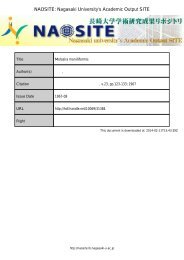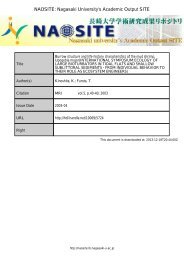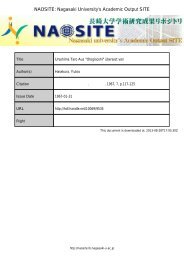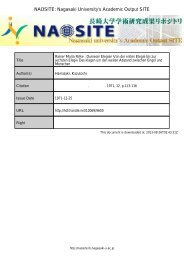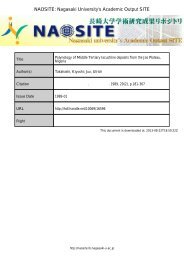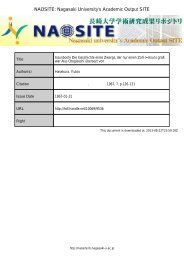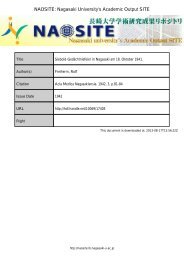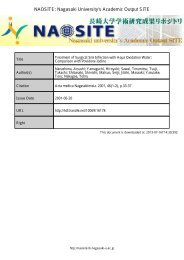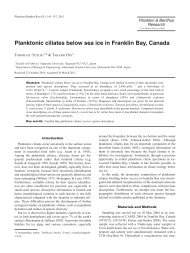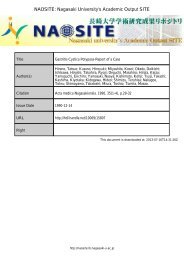An Interview with Malika Jayasinghe on Aspects of Culture in Sri ...
An Interview with Malika Jayasinghe on Aspects of Culture in Sri ...
An Interview with Malika Jayasinghe on Aspects of Culture in Sri ...
Create successful ePaper yourself
Turn your PDF publications into a flip-book with our unique Google optimized e-Paper software.
<str<strong>on</strong>g>An</str<strong>on</strong>g> <str<strong>on</strong>g>Interview</str<strong>on</strong>g> <str<strong>on</strong>g>with</str<strong>on</strong>g> <str<strong>on</strong>g>Malika</str<strong>on</strong>g> <str<strong>on</strong>g>Jayas<strong>in</strong>ghe</str<strong>on</strong>g> <strong>on</strong><br />
<strong>Aspects</strong> <strong>of</strong> <strong>Culture</strong> <strong>in</strong> <strong>Sri</strong> Lanka<br />
LeRoyRob<strong>in</strong>s<strong>on</strong><br />
<str<strong>on</strong>g>Malika</str<strong>on</strong>g> <str<strong>on</strong>g>Jayas<strong>in</strong>ghe</str<strong>on</strong>g> is a free-lance journalist who c<strong>on</strong>tributes articles<br />
to the <strong>Sri</strong> Lanka English-language newspapers, The Sunday Observer,<br />
The Even<strong>in</strong>g Observer, The Weekend, The Daily Sun, and The Daily<br />
News.<br />
She was born <strong>in</strong> Matara, a coastal town <strong>in</strong> the south <strong>of</strong> <strong>Sri</strong> Lanka,<br />
and had her early educati<strong>on</strong> at St. Mary's C<strong>on</strong>vent <strong>in</strong> the same town.<br />
She is married to a doctor and has four children.<br />
<str<strong>on</strong>g>Malika</str<strong>on</strong>g> <str<strong>on</strong>g>Jayas<strong>in</strong>ghe</str<strong>on</strong>g>, a collector <strong>of</strong> antiques, has written <str<strong>on</strong>g>An</str<strong>on</strong>g> American<br />
Heritage, a book <strong>on</strong> American antique silver and furniture.<br />
She has a special <strong>in</strong>terest <strong>in</strong> porcela<strong>in</strong> and is writ<strong>in</strong>g a book <strong>on</strong><br />
Japanese porcela<strong>in</strong>.<br />
She is also writ<strong>in</strong>g a book <strong>on</strong> India.<br />
A practic<strong>in</strong>g Buddhist, she has also written about Buddhism. She is<br />
presently mak<strong>in</strong>g a study <strong>of</strong> Buddhist shr<strong>in</strong>es and temples <strong>in</strong> <strong>Sri</strong> Lanka.<br />
ROBINSON: What was the atmosphere like at St. Mary's C<strong>on</strong>vent<br />
when you went to school there?<br />
JAYASINGHE: It was a very sedate envir<strong>on</strong>ment where we learned<br />
discipl<strong>in</strong>e above all else. Like every school here at that time,<br />
St. Mary's was a force for br<strong>in</strong>g<strong>in</strong>g our people together. All<br />
children studied <strong>in</strong> English. So we were not even aware <strong>of</strong> <strong>on</strong>e
150<br />
another's nati<strong>on</strong>ality. It was an extremely w<strong>on</strong>derful situati<strong>on</strong><br />
that brought about complete understand<strong>in</strong>g and trust.<br />
ROBINSON: Your essay <strong>in</strong> New Ceyl<strong>on</strong> Wn·t<strong>in</strong>g 5 advocates the use<br />
<strong>of</strong> English as an agent <strong>of</strong> unity <strong>in</strong> <strong>Sri</strong> Lanka. Do many people<br />
<strong>in</strong> <strong>Sri</strong> Lanka accept this way <strong>of</strong> th<strong>in</strong>k<strong>in</strong>g?<br />
JAY ASING HE : Yes, def<strong>in</strong>itely. Today' s problem is not a class <strong>on</strong>e,<br />
as imag<strong>in</strong>ed by some, but a problem brought <strong>on</strong> by an unrealistic<br />
language policy. After political emancipati<strong>on</strong>, we had to c<strong>on</strong>tend<br />
<str<strong>on</strong>g>with</str<strong>on</strong>g> many problems. The residue <strong>of</strong> British imperialism. But<br />
we so<strong>on</strong> learned to overcome them. I th<strong>in</strong>k the most significant<br />
achievement was our ability to live together ignor<strong>in</strong>g l<strong>in</strong>guistic,<br />
racial or religious aff<strong>in</strong>ities and identities. We were all aware<br />
<strong>of</strong> the major role played by the m<strong>in</strong>orities <strong>in</strong> our struggle for<br />
<strong>in</strong>dependence, and for this we have to be grateful.<br />
ROBINSON: Would you menti<strong>on</strong> at least the names <strong>of</strong> some <strong>of</strong> the<br />
m<strong>in</strong>ority people you're referr<strong>in</strong>g to?<br />
JA Y ASINGHE: There were many Tamil patriots like P<strong>on</strong>nambalam<br />
Ramanathan and P<strong>on</strong>nambalam Arunachalam. There were Mus<br />
lims like Siddi Lebbe, who fought to preserve Islam dur<strong>in</strong>g British<br />
rule, who stood shoulder to shoulder <str<strong>on</strong>g>with</str<strong>on</strong>g> the S<strong>in</strong>halese <strong>in</strong> our<br />
fight aga<strong>in</strong>st imperialism. Unfortunately, the S<strong>in</strong>hala Only policy<br />
gave rise to the dom<strong>in</strong>ati<strong>on</strong> <strong>of</strong> sectarian cries, heard over the<br />
demands <strong>of</strong> nati<strong>on</strong>alism. There were urgent appeals by the Tamils<br />
for the restorati<strong>on</strong> <strong>of</strong> rights they alleged they had been deprived<br />
<strong>of</strong>.<br />
ROBINSON: Why do you say "alleged"?<br />
JA YASINGHE: I do not th<strong>in</strong>k the m<strong>in</strong>orities here have been deprived<br />
<strong>of</strong> any rights. We have never thought <strong>of</strong> the m<strong>in</strong>orities as people<br />
bel<strong>on</strong>g<strong>in</strong>g to other races. There has been no discrim<strong>in</strong>ati<strong>on</strong> <strong>on</strong>
<str<strong>on</strong>g>An</str<strong>on</strong>g> <str<strong>on</strong>g>Interview</str<strong>on</strong>g> <str<strong>on</strong>g>with</str<strong>on</strong>g> <str<strong>on</strong>g>Malika</str<strong>on</strong>g> <str<strong>on</strong>g>Jayas<strong>in</strong>ghe</str<strong>on</strong>g> <strong>on</strong> <strong>Aspects</strong> <strong>of</strong> <strong>Culture</strong> <strong>in</strong> <strong>Sri</strong> Lanka 151<br />
the part <strong>of</strong> the government, either. We can see people <strong>of</strong> all<br />
races liv<strong>in</strong>g together <strong>in</strong> hous<strong>in</strong>g complexes, for <strong>in</strong>stance. It's a<br />
good example <strong>of</strong> the unity that prevails even today am<strong>on</strong>g people<br />
<strong>of</strong> different creeds. It was the language issue that brought <strong>on</strong><br />
so much disc<strong>on</strong>tent.<br />
ROBINSON: But as far as English as an agent <strong>of</strong> unity is c<strong>on</strong>cerned,<br />
there are some people <strong>in</strong> <strong>Sri</strong> Lanka who do not accept this idea.<br />
JA YASINGHE: Yes, a few feel that a comm<strong>on</strong> language cannot br<strong>in</strong>g<br />
about racial harm<strong>on</strong>y. Perhaps they have a po<strong>in</strong>t there. Nati<strong>on</strong>al<br />
unity must rest <strong>on</strong> the broad-m<strong>in</strong>dedness <strong>of</strong> the people. In a<br />
land where the majority are Buddhists, our ideas and plans must<br />
harm<strong>on</strong>ize <str<strong>on</strong>g>with</str<strong>on</strong>g> the teach<strong>in</strong>gs <strong>of</strong> the Buddha. Tolerance and<br />
understand<strong>in</strong>g are the <strong>on</strong>ly th<strong>in</strong>gs that can hold our society to<br />
gether. I ma<strong>in</strong>ta<strong>in</strong> that the language change did br<strong>in</strong>g about the<br />
present problem, for it cut across the nati<strong>on</strong>al fabric, throw<strong>in</strong>g<br />
everyth<strong>in</strong>g <strong>in</strong>to disarray. It c<strong>on</strong>tributed <strong>in</strong> no small measure to<br />
the envy and frustrati<strong>on</strong>s that have surfaced <strong>in</strong> the acti<strong>on</strong>s and<br />
attitudes <strong>of</strong> <strong>in</strong>dividuals and groups today. The absence <strong>of</strong> a l<strong>in</strong>k<br />
language has kept people apart. Without it, even children are<br />
segregated. Community amity and <strong>in</strong>ter-racial understand<strong>in</strong>g<br />
beg<strong>in</strong> <strong>in</strong> the classroom.<br />
ROBINSON: The S<strong>in</strong>hala Only policy was <strong>in</strong>stituted <strong>in</strong> 1956. What<br />
is the language policy <strong>of</strong> the present government?<br />
JAYASINGHE: The government now realizes steps must be taken to<br />
make people feel that they bel<strong>on</strong>g to <strong>on</strong>e nati<strong>on</strong>ality. The country<br />
needs a comm<strong>on</strong> identity. One answer to the prevail<strong>in</strong>g problem<br />
is to make English a l<strong>in</strong>k language. The M<strong>in</strong>istry <strong>of</strong> Educati<strong>on</strong><br />
is giv<strong>in</strong>g this idea much attenti<strong>on</strong>. Study<strong>in</strong>g <strong>on</strong>ly <strong>in</strong> S<strong>in</strong>hala or<br />
Tamil also hampers progress, as it shuts the door to knowledge.
152<br />
The government has realized it must remedy this grave problem.<br />
It's time to close ranks if we are to achieve any degree <strong>of</strong> devel<br />
opment and harm<strong>on</strong>y. The diversity <strong>of</strong> our country is beautiful.<br />
We have to use that diversity to the best advantage <strong>of</strong> the<br />
country. It's unbelievable that this <strong>on</strong>ce peaceful land is now<br />
riven by c<strong>on</strong>flict and dissensi<strong>on</strong>. The political and social pendulum<br />
can hardly be expected to sw<strong>in</strong>g overnight from the present<br />
unstable positi<strong>on</strong> to complete unity and <strong>on</strong>eness. But it has begun<br />
its clear and irreversible movement <strong>in</strong> that directi<strong>on</strong>.<br />
ROBINSON: In your op<strong>in</strong>i<strong>on</strong>, what are the ma<strong>in</strong> causes <strong>of</strong> today's<br />
ethnic c<strong>on</strong>flict?<br />
JAYASINGHE: <strong>Sri</strong> Lanka has become a hot cauldr<strong>on</strong> <strong>of</strong> c<strong>on</strong>flict<br />
because a small group keeps mak<strong>in</strong>g unreas<strong>on</strong>able demands. This<br />
sad situati<strong>on</strong> was triggered by the language policy. The displace<br />
ment <strong>of</strong> English by S<strong>in</strong>hala and Tamil highlighted differences<br />
<strong>in</strong> certa<strong>in</strong> spheres and emphasized social disparities. A group<br />
detached from the ma<strong>in</strong> populati<strong>on</strong> by language and customs has<br />
affected the stability <strong>of</strong> a <strong>on</strong>ce united nati<strong>on</strong>.<br />
ROBINSON: Who are the members <strong>of</strong> this small group mak<strong>in</strong>g what<br />
unreas<strong>on</strong>able demands?<br />
JA YASINGHE: Those who talk <strong>of</strong> a separate state, <strong>of</strong> course. Today's<br />
ethnicity is real. Yes. But is that the <strong>on</strong>ly reality? Aren't we<br />
go<strong>in</strong>g from that reality to a greater and fuller <strong>on</strong>e? As for English,<br />
<strong>in</strong> retrospect it seems remarkable how English forged a l<strong>in</strong>k be<br />
tween people <strong>of</strong> different cultures and creeds. The S<strong>in</strong>hala Only<br />
policy was the wedge that drove people apart, disturb<strong>in</strong>g the<br />
framework <strong>of</strong> cooperati<strong>on</strong> that had existed <str<strong>on</strong>g>with</str<strong>on</strong>g><strong>in</strong> the country.<br />
The <strong>Sri</strong> Lankan c<strong>on</strong>stituti<strong>on</strong> guarantees the freedom <strong>of</strong> every<br />
citizen <strong>in</strong> the land. Noth<strong>in</strong>g <strong>in</strong> the country bel<strong>on</strong>gs to any<strong>on</strong>e
<str<strong>on</strong>g>An</str<strong>on</strong>g> <str<strong>on</strong>g>Interview</str<strong>on</strong>g> <str<strong>on</strong>g>with</str<strong>on</strong>g> <str<strong>on</strong>g>Malika</str<strong>on</strong>g> <str<strong>on</strong>g>Jayas<strong>in</strong>ghe</str<strong>on</strong>g> <strong>on</strong> <strong>Aspects</strong> <strong>of</strong> <strong>Culture</strong> <strong>in</strong> <strong>Sri</strong> Lanka 153<br />
sect or creed. We cannot even say that Buddhism is unique to<br />
the S<strong>in</strong>halese.<br />
Quite apart from this, it's an <strong>in</strong>terest<strong>in</strong>g fact that<br />
J affna, the hotbed <strong>of</strong> terrorism, is l<strong>in</strong>ked to the rest <strong>of</strong> the<br />
country by cultural and religious ties. The Mahavamsa has<br />
recorded that the Sacred Bo Tree venerated by all Buddhists<br />
was sent from India to K<strong>in</strong>g Devanamiyatissa <strong>in</strong> 307 B. C. and<br />
was first situated there, <strong>in</strong> Kolumbutarai <strong>in</strong> the south <strong>of</strong> Jaffna,<br />
and a shr<strong>in</strong>e was erected there to commemorate the event. The<br />
headquarters <strong>of</strong> the powerful prelates <strong>of</strong> the Buddhist order,<br />
namely the Malwatte and Asgiriya chapters, are located outside<br />
this sacred city.<br />
ROBINSON: How do you feel about the present government's other<br />
policies <strong>in</strong> the current crisis?<br />
JA YASINGHE: The government has come up <str<strong>on</strong>g>with</str<strong>on</strong>g> a package <strong>of</strong><br />
proposals which we hope will solve the present dilemna. It<br />
provides the basis for a just and equitable soluti<strong>on</strong> lead<strong>in</strong>g to<br />
the devoluti<strong>on</strong> <strong>of</strong> power that would enable the various prov<strong>in</strong>ces<br />
to manage the affairs <strong>of</strong> their respective regi<strong>on</strong>s. The government<br />
wishes to be fair. It does not envisi<strong>on</strong> a social structure that<br />
is centralized, all-powerful, all-pervasive, <strong>in</strong> its c<strong>on</strong>trol <strong>of</strong> the<br />
<strong>in</strong>dividual, whatever his race or religi<strong>on</strong>.<br />
ROBINSON: Is there anyth<strong>in</strong>g you can say about the ec<strong>on</strong>omic factors<br />
relative to this dilemna?<br />
JAYASINGHE: <strong>Sri</strong> Lanka is a develop<strong>in</strong>g country. We face many<br />
problems. As a Third W orId country, we have been deprived<br />
<strong>of</strong> a fair share <strong>of</strong> the <strong>in</strong>ternati<strong>on</strong>al ec<strong>on</strong>omic life, due to the<br />
m<strong>on</strong>opolistic practices <strong>of</strong> <strong>in</strong>dustrialized countries. I w<strong>on</strong>der whther<br />
people liv<strong>in</strong>g <strong>in</strong> affluent countries can really understand our
154<br />
problems. As N aipul said <strong>in</strong> his book Hot Country, "Your idea<br />
<strong>of</strong> the 'Third World' and m<strong>in</strong>e must be so impossibly different."<br />
The ma<strong>in</strong> problem is the ec<strong>on</strong>omic <strong>on</strong>e brought <strong>on</strong> by a difficult<br />
and frustrat<strong>in</strong>g fight aga<strong>in</strong>st many forces- -exploitati<strong>on</strong> by foreign<br />
rulers, and more recently our massive defense bills, our <strong>in</strong>ability<br />
to compete <str<strong>on</strong>g>with</str<strong>on</strong>g> more <strong>in</strong>dustrialized countries <strong>in</strong> the world market.<br />
ROBINSON: What are <strong>Sri</strong> Lanka's future prospects then?<br />
JA YASINGHE: Th<strong>in</strong>gs will change. People change. Countries change.<br />
<strong>Sri</strong> Lanka will change. It is <strong>in</strong> the nature <strong>of</strong> th<strong>in</strong>gs. Already<br />
the government has taken mean<strong>in</strong>gful steps to remedy most <strong>of</strong><br />
our problems, c<strong>on</strong>structive measures to build a new Lanka. The<br />
massive Mahaveli project is <strong>on</strong>e. The reservoirs that come under<br />
this scheme will br<strong>in</strong>g thousands <strong>of</strong> acres under cultivati<strong>on</strong>,<br />
result<strong>in</strong>g, no doubt, <strong>in</strong> more jobs and food. If th<strong>in</strong>gs go well,<br />
<strong>Sri</strong> Lanka will <strong>on</strong>ce aga<strong>in</strong> be called "the granary <strong>of</strong> the East."<br />
We are enter<strong>in</strong>g a new era <strong>of</strong> technological, <strong>in</strong>dustrial and com<br />
puter educati<strong>on</strong>, giv<strong>in</strong>g the people a chance to compete <str<strong>on</strong>g>with</str<strong>on</strong>g> the<br />
rest <strong>of</strong> the world. The government's liberalized policies have<br />
freed the country from outmoded shibboleths and kept the door<br />
open for free enterprise. This could mean a more prosperous<br />
era for the country.<br />
ROBINSON: That may be so, but <strong>on</strong>e <strong>of</strong> the problems <strong>of</strong> <strong>Sri</strong> Lanka<br />
today is "bra<strong>in</strong> dra<strong>in</strong>". <str<strong>on</strong>g>An</str<strong>on</strong>g>y comments <strong>on</strong> those who leave the<br />
country <strong>in</strong> search <strong>of</strong> greener pastures?<br />
JAYASINGHE: Yes, we have a number <strong>of</strong> people, especially pr<strong>of</strong>es<br />
si<strong>on</strong>als, leav<strong>in</strong>g the country every year, <strong>in</strong> search <strong>of</strong> greener<br />
pastures, as you said. It's a fact that <strong>in</strong> <strong>Sri</strong> Lanka men and<br />
women do not always receive a fair return for their qualifi<br />
cati<strong>on</strong>s. The salaries <strong>of</strong>fered by more affluent societies are
<str<strong>on</strong>g>An</str<strong>on</strong>g> <str<strong>on</strong>g>Interview</str<strong>on</strong>g> <str<strong>on</strong>g>with</str<strong>on</strong>g> <str<strong>on</strong>g>Malika</str<strong>on</strong>g> J ayas<strong>in</strong>ghe <strong>on</strong> <strong>Aspects</strong> <strong>of</strong> <strong>Culture</strong> <strong>in</strong> <strong>Sri</strong> Lanka 155<br />
attractive. However, to me it seems rather unfair when <strong>Sri</strong><br />
Lankans turn their backs <strong>on</strong> a country that has given them so<br />
much. You know educati<strong>on</strong> here is absolutely free, and this<br />
<strong>in</strong>cludes university educati<strong>on</strong>. In such a c<strong>on</strong>text I feel that they<br />
shculd serve their country at <strong>on</strong>e time or another. It's a time<br />
to come together and pool our resources, our manpower, our<br />
creative abilities, our expertise, and build a new Lanka and<br />
advance as a develop<strong>in</strong>g nati<strong>on</strong>. What seems grossly unfair to<br />
me is when those who serve abroad come back to <strong>Sri</strong> Lanka<br />
<strong>in</strong> their old age, perhaps due to the fact they are no l<strong>on</strong>ger<br />
welcome <strong>in</strong> the countries they have worked <strong>in</strong>, or because they<br />
are c<strong>on</strong>sidered burdens to Western society <strong>on</strong>ce their usefulness<br />
is g<strong>on</strong>e. Should we accept them then? A def<strong>in</strong>ite NO! <str<strong>on</strong>g>An</str<strong>on</strong>g>anda<br />
Coomaraswamy, the philosopher and art expert, <strong>on</strong>ce wrote that<br />
there existed a situati<strong>on</strong> <strong>in</strong> <strong>Sri</strong> Lanka that created peculiar be<strong>in</strong>gs,<br />
"<strong>in</strong>tellectual pariahs." He was referr<strong>in</strong>g to another problem, but<br />
I th<strong>in</strong>k he saw ahead <strong>of</strong> his time when he said there were <strong>Sri</strong><br />
Lankans who bel<strong>on</strong>ged neither to the East nor the West.<br />
ROBINSON: To come back to you, you have said you could not pursue<br />
a university educati<strong>on</strong> because your parents did not want you<br />
exposed to life outside a traditi<strong>on</strong>al S<strong>in</strong>hala home. What is or<br />
was a traditi<strong>on</strong>al S<strong>in</strong>hala home?<br />
JAYASINGHE: I was not able to pursue higher educati<strong>on</strong> because my<br />
parents, especially my father, did not want me to enter a univer<br />
sity. They believed that stay<strong>in</strong>g at home and learn<strong>in</strong>g the arts<br />
and crafts <strong>of</strong> housekeep<strong>in</strong>g was all that was necessary for a girl<br />
who ultimately had to settle down to be<strong>in</strong>g a wife and mother.<br />
They felt a sheltered life ensured good breed<strong>in</strong>g, and exposure<br />
to outside <strong>in</strong>fluences could make a girl rather unstable. This was
<str<strong>on</strong>g>An</str<strong>on</strong>g> <str<strong>on</strong>g>Interview</str<strong>on</strong>g> <str<strong>on</strong>g>with</str<strong>on</strong>g> <str<strong>on</strong>g>Malika</str<strong>on</strong>g> <str<strong>on</strong>g>Jayas<strong>in</strong>ghe</str<strong>on</strong>g> <strong>on</strong> <strong>Aspects</strong> <strong>of</strong> <strong>Culture</strong> <strong>in</strong> <strong>Sri</strong> Lanka 157<br />
<strong>in</strong> <strong>Sri</strong> Lanka?<br />
JAYASINGHE: A word about the Seva Vanitha Movement. It's an<br />
organizati<strong>on</strong> that safeguards the basic needs and fundamental<br />
rights <strong>of</strong> women. It has helped dispel the noti<strong>on</strong> that a woman<br />
is meant <strong>on</strong>ly for unobtrusive work <strong>in</strong> the house, and it has<br />
made it possible for women to take their rightful place al<strong>on</strong>gside<br />
their male counterparts. As a women's movement it has cooperated<br />
<str<strong>on</strong>g>with</str<strong>on</strong>g> government and n<strong>on</strong>-government agencies <strong>in</strong> implement<strong>in</strong>g<br />
programs that help f<strong>in</strong>d soluti<strong>on</strong>s to press<strong>in</strong>g problems and by<br />
encourag<strong>in</strong>g its members to take an active part <strong>in</strong> br<strong>in</strong>g<strong>in</strong>g about<br />
social change.<br />
ROBINSON: <str<strong>on</strong>g>An</str<strong>on</strong>g>y comment <strong>on</strong> a women's organizati<strong>on</strong> <strong>in</strong> <strong>Sri</strong> Lanka<br />
called Women Aga<strong>in</strong>st Racism, Militarizati<strong>on</strong> and Violence?<br />
JA YASINGHE: There is no racism <strong>in</strong> <strong>Sri</strong> Lanka. If there was, we<br />
would not have had S. Sharvananda, a Tamil, as Chief Justice;<br />
Rudra Rajas<strong>in</strong>gham, a Tamil, as head <strong>of</strong> the police; Tamil cab<strong>in</strong>et<br />
m<strong>in</strong>isters, judges, pr<strong>of</strong>essors, heads <strong>of</strong> organizati<strong>on</strong>s. The list<br />
goes <strong>on</strong> and <strong>on</strong>. They all enjoy the benefits <strong>of</strong> a free society<br />
and they have been accepted as equals <strong>in</strong> every home, <strong>of</strong>fice<br />
and school. If the government has taken acti<strong>on</strong> ags<strong>in</strong>st a group<br />
<strong>of</strong> people who believe <strong>in</strong> violence, it cannot be termed racism.<br />
Rajiv Gandhi has taken the sternest measures aga<strong>in</strong>st Sikh<br />
extremists. The British government keeps fight<strong>in</strong>g the I. R. A.<br />
The whole <strong>of</strong> Europe has jo<strong>in</strong>ed hands to wipe out terrorist<br />
groups that operate under different names. Terrorism is a total<br />
rejecti<strong>on</strong> <strong>of</strong> moral c<strong>on</strong>stra<strong>in</strong>ts and therefore must be c<strong>on</strong>d<strong>on</strong>ed<br />
by right-th<strong>in</strong>k<strong>in</strong>g people.<br />
ROBINSON: Your menti<strong>on</strong> <strong>of</strong> Rajiv Gandhi is a rem<strong>in</strong>der you are<br />
writ<strong>in</strong>g a book about India, about the Nehrus and Gandhis.
158<br />
JA Y ASINGHE: Yes. I admire them for their great courage and patri<br />
otism <strong>in</strong> the face <strong>of</strong> imperialistic power. Mrs. Gandhi and her<br />
policies did come <strong>in</strong> for great criticism at times; however, she<br />
was a woman <strong>of</strong> <strong>in</strong>telligence and comm<strong>on</strong> sense. She saw ahead<br />
<strong>of</strong> her times. She was aware that India's boundaries could never<br />
c<strong>on</strong>ta<strong>in</strong> its teem<strong>in</strong>g milli<strong>on</strong>s. So she had to stall the chaos and<br />
c<strong>on</strong>fusi<strong>on</strong> that over-populati<strong>on</strong> threatened to br<strong>in</strong>g about. Her<br />
approach to the problem was perhaps wr<strong>on</strong>g, but she was ready<br />
to pursue any path that could br<strong>in</strong>g prosperity to her people.<br />
As you know, most people did not agree <str<strong>on</strong>g>with</str<strong>on</strong>g> her, and it f<strong>in</strong>ally<br />
c<strong>on</strong>tributed to her downfall. Unfortunately, there is an atavistic<br />
suspici<strong>on</strong> <strong>in</strong> the m<strong>in</strong>ds <strong>of</strong> many people that women are not stable<br />
enough to occupy positi<strong>on</strong>s <strong>of</strong> power. I th<strong>in</strong>k that both Mrs.<br />
Gandhi and our ex-Prime M<strong>in</strong>ister Mrs. Sirimavo Bandaranaike<br />
were handicapped merely by the fact they were women.<br />
ROBINSON: Can the Bandaranaike family be c<strong>on</strong>sidered the <strong>Sri</strong> Lan<br />
kan equivalent <strong>of</strong> the Gandhis?<br />
JA YASINGHE: Well, it's rather difficult to compare families liv<strong>in</strong>g<br />
<strong>in</strong> two different countries. The vastness <strong>of</strong> India itself makes it<br />
so different from our country. There are other differences: our<br />
society, our patterns, our standards <strong>of</strong> liv<strong>in</strong>g, our needs. The<br />
Nehrus were an outstand<strong>in</strong>g family that c<strong>on</strong>tributed much to<br />
India, its history, its future. Our struggle for <strong>in</strong>dependence was<br />
not so dramatic. It was fought silently by a band <strong>of</strong> patriotic<br />
men who ultimately freed the land from the yoke <strong>of</strong> foreign rule.<br />
You cannot s<strong>in</strong>gle out any<strong>on</strong>e family here and say it made the<br />
greatest c<strong>on</strong>tributi<strong>on</strong> to our country.<br />
ROBINSON: Gett<strong>in</strong>g back to you--aga<strong>in</strong>--has be<strong>in</strong>g married <strong>in</strong>terfered<br />
much <str<strong>on</strong>g>with</str<strong>on</strong>g> your career as a free-lance journalist?
<str<strong>on</strong>g>An</str<strong>on</strong>g> <str<strong>on</strong>g>Interview</str<strong>on</strong>g> <str<strong>on</strong>g>with</str<strong>on</strong>g> <str<strong>on</strong>g>Malika</str<strong>on</strong>g> <str<strong>on</strong>g>Jayas<strong>in</strong>ghe</str<strong>on</strong>g> <strong>on</strong> <strong>Aspects</strong> <strong>of</strong> <strong>Culture</strong> <strong>in</strong> <strong>Sri</strong> Lanka 159<br />
JA YASINGHE: I married a doctor <strong>in</strong> 1960 and settled down to my<br />
housework and child rear<strong>in</strong>g. I have four children. My husband<br />
is a busy private practiti<strong>on</strong>er, and his work did not permit him<br />
to spend much time <str<strong>on</strong>g>with</str<strong>on</strong>g> the family. So a large porti<strong>on</strong> <strong>of</strong> the<br />
burden <strong>of</strong> br<strong>in</strong>g<strong>in</strong>g up a young family fell <strong>on</strong> my shoulders.<br />
But I did not resent it. I fully understood my husband's diffi<br />
culties. But what bothered me was the fact that I couldn't f<strong>in</strong>d<br />
time to do what I liked best- -writ<strong>in</strong>g. However, when my eldest<br />
child was around fifteen years old, I took up writ<strong>in</strong>g seriously.<br />
ROBINSON: In Japan there are two k<strong>in</strong>ds <strong>of</strong> marriages, by the way.<br />
Love marriages and arranged marriages.<br />
JA YASINGHE: In <strong>Sri</strong> Lanka it is the same- -we have love marriages<br />
and arranged marriages. In arranged marriages, the parents<br />
select the partner. When do<strong>in</strong>g that, they look <strong>in</strong>to the prospec<br />
tive partner's antecdents, social background, f<strong>in</strong>ancial positi<strong>on</strong>;<br />
and educati<strong>on</strong>al qualificati<strong>on</strong>s. When these c<strong>on</strong>diti<strong>on</strong>s have been<br />
satisfied, they have the two partners' horoscopes compared. The<br />
horoscope is drawn up <strong>on</strong> an ala leaf and is based entirely <strong>on</strong><br />
a pers<strong>on</strong>'s time <strong>of</strong> birth. Astrologers claim that the comparis<strong>on</strong><br />
will reveal whether the two people are compatible and whether<br />
the marriage will be successful.<br />
ROBINSON: Do most young people accept this ancient custom?<br />
JA YASINGHE: ,Many people th<strong>in</strong>k it is foolish to allow <strong>on</strong>e's life to<br />
be ruled by such n<strong>on</strong>sense. Yet statistically it has been proved<br />
that <strong>in</strong> <strong>Sri</strong> Lanka arranged marriages have been more successful<br />
than love marriages. Perhaps this is due to the fact that parents<br />
take a great deal <strong>of</strong> care when select<strong>in</strong>g partners for their children,<br />
and not because <strong>of</strong> an astrologer's expertise.<br />
ROBINSON: What do your children do, by the way?
160<br />
JA YASINGHE: The eldest is married. One is study<strong>in</strong>g accountancy.<br />
One has just been accepted at Colombo University. The other<br />
is a high school student.<br />
ROBINSON: May I ask how old you are?<br />
JA YASINGHE: Yes, you may, but I prefer not to answer. D<strong>on</strong>'t you<br />
know that Eastern women especially fight shy <strong>of</strong> reveal<strong>in</strong>g their<br />
age?<br />
ROBINSON: Would you like to say someth<strong>in</strong>g about your partner <strong>in</strong><br />
marriage?<br />
JA YASINGHE: As I said, my husband is a doctor. He is a private<br />
practiti<strong>on</strong>er who has his own surgery. By this I mean an outpa<br />
tients cl<strong>in</strong>ic. They are not resident here, merely treated 'and<br />
sent away daily. It is a difficult and try<strong>in</strong>g job s<strong>in</strong>ce patients<br />
call over for treatment at any time <strong>of</strong> the day and night. At<br />
the beg<strong>in</strong>n<strong>in</strong>g <strong>of</strong> our married life--that was 26 years ago--he had<br />
little time for anyth<strong>in</strong>g other than his medical work. But now<br />
he has orgnized th<strong>in</strong>gs so that he has enough time to <strong>in</strong>dulge<br />
<strong>in</strong> other activities.<br />
ROBINSON: Such as?<br />
JA YASINGHE: He's greatly <strong>in</strong>volved <strong>in</strong> orchid cultivati<strong>on</strong>. He does<br />
his own cultur<strong>in</strong>g. He's exhibited and w<strong>on</strong> awards at shows.<br />
For example, he w<strong>on</strong> the award <strong>of</strong> merit for his own hybrid<br />
called D. Jacquel<strong>in</strong>e Hawaii Self. He's a keen photographer too.<br />
He develops and pr<strong>in</strong>ts his own pictures at home. He does both<br />
color and black and white. In 1974 he w<strong>on</strong> the first prize for<br />
the best color picture at the all-island competiti<strong>on</strong> sp<strong>on</strong>sored by<br />
the <strong>Sri</strong> Lanka Photographic Society.<br />
ROBINSON: Is this <strong>in</strong>terest <strong>in</strong> hobbies typical <strong>of</strong> doctors <strong>in</strong> <strong>Sri</strong> Lanka?<br />
JAYASINGHE: Doctors <strong>in</strong> <strong>Sri</strong> Lanka are extremely busy. They f<strong>in</strong>d
<str<strong>on</strong>g>An</str<strong>on</strong>g> <str<strong>on</strong>g>Interview</str<strong>on</strong>g> <str<strong>on</strong>g>with</str<strong>on</strong>g> <str<strong>on</strong>g>Malika</str<strong>on</strong>g> <str<strong>on</strong>g>Jayas<strong>in</strong>ghe</str<strong>on</strong>g> <strong>on</strong> <strong>Aspects</strong> <strong>of</strong> <strong>Culture</strong> <strong>in</strong> <strong>Sri</strong> Lanka 161<br />
little time to <strong>in</strong>dulge <strong>in</strong> other activities. Some play games like<br />
tennis and squash for the sake <strong>of</strong> their health. In the past we<br />
had a number <strong>of</strong> doctors who were scholars. Dr. R. L. Spittel<br />
and Dr. A. P. De Soysa were outstand<strong>in</strong>g people who c<strong>on</strong>tributed<br />
much to <strong>Sri</strong> Lanka's culture. Dr. Spittel, for example, wrote<br />
extensively <strong>on</strong> the Veddahs, <strong>Sri</strong> Lanka's aborig<strong>in</strong>es, from the<br />
troglodyte stage to the beg<strong>in</strong>n<strong>in</strong>gs <strong>of</strong> the hut dwellers. His best<br />
known book <strong>on</strong> the Veddahs is Vanished Trails. Dr. De Soysa<br />
compiled a S<strong>in</strong>hala-English dicti<strong>on</strong>ary. Today we have an em<strong>in</strong>ent<br />
medical man who is the Pr<strong>of</strong>essor <strong>of</strong> Medic<strong>in</strong>e at the Colombo<br />
University, Dr. K. Dharmadasa, who is well-versed <strong>in</strong> history and<br />
the classics and who takes time <strong>of</strong>f from his lucrative medical<br />
practice to delve <strong>in</strong>to subjects far removed from science and<br />
medic<strong>in</strong>e.<br />
There are a few doctors who are <strong>in</strong>terested <strong>in</strong> <strong>Sri</strong><br />
Lanka's past, especially <strong>in</strong> relati<strong>on</strong> to the early methods <strong>of</strong> medical<br />
treatment. Recently, the President <strong>of</strong> the College <strong>of</strong> Physicians,<br />
Dr. Lakshman· Ranas<strong>in</strong>ghe (<strong>in</strong>cidentally, he was the President <strong>of</strong><br />
the <strong>Sri</strong> Lanka Medical Associati<strong>on</strong> last year), made this the<br />
subject <strong>of</strong> his presidential address. He supported his lecture <str<strong>on</strong>g>with</str<strong>on</strong>g><br />
slides depict<strong>in</strong>g ancient methods <strong>of</strong> treatment and the implements<br />
used <strong>in</strong> the preparati<strong>on</strong> <strong>of</strong> medic<strong>in</strong>e. He said that recent excava<br />
ti<strong>on</strong>s had revealed many <strong>in</strong>terest<strong>in</strong>g th<strong>in</strong>gs--hot water bottles,<br />
<strong>in</strong>tricate toilet units c<strong>on</strong>sist<strong>in</strong>g <strong>of</strong> ur<strong>in</strong>als and lavatories, and very<br />
good waste and sewage disposal systems, all provid<strong>in</strong>g useful<br />
data <strong>on</strong> <strong>Sri</strong> Lanka civilizati<strong>on</strong> and traditi<strong>on</strong>. Two other doctors<br />
who have probed <strong>in</strong>to the early history <strong>of</strong> medical treatment <strong>in</strong><br />
<strong>in</strong> <strong>Sri</strong> Lanka are Dr. C. G. Uragoda and Dr. Denis Aloysius.<br />
(Aloysius is greatly <strong>in</strong>volved <strong>in</strong> research <strong>on</strong> snakes and snake
162<br />
venom, too.) Also the M<strong>in</strong>istry <strong>of</strong> Indigenous Medic<strong>in</strong>e has taken<br />
steps to establish a museum to display the traditi<strong>on</strong>al Ayurvedic<br />
ala leaf medic<strong>in</strong>al scripts and implements used <strong>in</strong> the past.<br />
ROBINSON: What k<strong>in</strong>ds <strong>of</strong> doctors' organizati<strong>on</strong>s are there <strong>in</strong> <strong>Sri</strong><br />
Lanka?<br />
JA YASINGHE: There are many. The College <strong>of</strong> Physicians. The<br />
College <strong>of</strong> Surge<strong>on</strong>s. The Psychiatric Associati<strong>on</strong>. The Associ<br />
ati<strong>on</strong> <strong>of</strong> Dermatology. The largest is the <strong>Sri</strong> Lanka Medical<br />
Associati<strong>on</strong>. It has about 1,500 members <strong>of</strong> different races and<br />
creeds. Its primary purpose is to promote health educatio!l and<br />
foster medical research. Doctors who bel<strong>on</strong>g to the Associati<strong>on</strong><br />
<strong>of</strong>ten organize health camps for patients <strong>in</strong> rural areas. They are<br />
committed to the welfare, the survival, <strong>of</strong> children. The S. L.<br />
M. A. fights aga<strong>in</strong>st malnutriti<strong>on</strong>, dysentery, and other preventable<br />
diseases. Its achievement <strong>in</strong> this field is an example to all.<br />
ROBINSON: What is your husband's given name, by the way?<br />
JA Y ASINGHE: His first name is Shelt<strong>on</strong>. Yes, a Western name.<br />
Speak<strong>in</strong>g <strong>of</strong> names, though the other three members <strong>of</strong> my own<br />
family have Western <strong>on</strong>es, strangely my parents chose an Eastern<br />
name for me. But my name, <str<strong>on</strong>g>Malika</str<strong>on</strong>g>, is not <strong>of</strong> S<strong>in</strong>hala orig<strong>in</strong>.<br />
I was told by a foreign friend that <str<strong>on</strong>g>Malika</str<strong>on</strong>g> is a Malaysian name<br />
and means a garland <strong>of</strong> flowers. I d<strong>on</strong>'t know \yhether this is<br />
true! As for names <strong>in</strong> <strong>Sri</strong> Lanka , you know <strong>in</strong> the 1920s and<br />
30s we had a great religious leader, the ardent nati<strong>on</strong>alist <str<strong>on</strong>g>An</str<strong>on</strong>g>aga<br />
rika Dharmapala, who was violently opposed to the idea <strong>of</strong><br />
S<strong>in</strong>halese children hav<strong>in</strong>g English names. He even went to the<br />
extent <strong>of</strong> pers<strong>on</strong>ally reprimand<strong>in</strong>g parents who were resp<strong>on</strong>sible<br />
for this. He stressed the fact that <strong>on</strong>e had to be proud to have<br />
a S<strong>in</strong>hala name.
<str<strong>on</strong>g>An</str<strong>on</strong>g> <str<strong>on</strong>g>Interview</str<strong>on</strong>g> <str<strong>on</strong>g>with</str<strong>on</strong>g> <str<strong>on</strong>g>Malika</str<strong>on</strong>g> <str<strong>on</strong>g>Jayas<strong>in</strong>ghe</str<strong>on</strong>g> <strong>on</strong> <strong>Aspects</strong> <strong>of</strong> <strong>Culture</strong> <strong>in</strong> <strong>Sri</strong> Lanka 163<br />
ROBINSON: Perhaps the <str<strong>on</strong>g>An</str<strong>on</strong>g>agarika was too ardent.<br />
JA YASINGHE: Let me just say that I th<strong>in</strong>k my generati<strong>on</strong> was un<br />
fortunate to be born at a moment when there was a pa<strong>in</strong>ful<br />
transiti<strong>on</strong> from col<strong>on</strong>ialism to <strong>in</strong>dependence. It affected practi<br />
cally every<strong>on</strong>e liv<strong>in</strong>g <strong>in</strong> <strong>Sri</strong> Lanka as the idea <strong>of</strong> imperialism<br />
crumbled <strong>on</strong> all sides. The result was that people were not totally<br />
Western or totally Eastern, caught as they were between a<br />
reced<strong>in</strong>g Western <strong>in</strong>fluence and an emerg<strong>in</strong>g S<strong>in</strong>halese <strong>on</strong>e.<br />
ROBINSON: As a journalist you specialize <strong>in</strong> art and subjects related<br />
to art. Was there any c<strong>on</strong>necti<strong>on</strong> between ancient art <strong>in</strong> <strong>Sri</strong><br />
Lanka and art outside?<br />
JAYASINGHE: Eastern art has def<strong>in</strong>ite l<strong>in</strong>ks <str<strong>on</strong>g>with</str<strong>on</strong>g> Western art. When<br />
identif<strong>in</strong>g broken bits <strong>of</strong> statues or even a torn pa<strong>in</strong>t<strong>in</strong>g <strong>of</strong> Oriental<br />
orig<strong>in</strong>, <strong>on</strong>e perceives the classical theories <strong>of</strong> ic<strong>on</strong>ometry and art<br />
found <strong>in</strong> the West. <strong>Sri</strong> Lankan culture is <strong>on</strong>e <strong>of</strong> the richest <strong>in</strong><br />
the world. This is proved by some <strong>of</strong> the splendid pa<strong>in</strong>t<strong>in</strong>gs and<br />
sculpture seen <strong>in</strong> the rock caves discovered <strong>on</strong> ancient sites.<br />
Pieces <strong>of</strong> ceramic bel<strong>on</strong>g<strong>in</strong>g to the period spann<strong>in</strong>g the 7th to<br />
12th centuries unearthed <strong>in</strong> excavati<strong>on</strong>s carried out <strong>in</strong> <strong>Sri</strong> Lanka<br />
<str<strong>on</strong>g>with</str<strong>on</strong>g> UNESCO have revealed l<strong>in</strong>ks between ancient Lanka and<br />
countries like Ch<strong>in</strong>a and Egypt. Co<strong>in</strong>s and beads from different<br />
regi<strong>on</strong>s have provided pro<strong>of</strong> <strong>of</strong> c<strong>on</strong>necti<strong>on</strong>s between <strong>Sri</strong> Lanka<br />
and Mahayana Buddhist countries like India and Ch<strong>in</strong>a. For<br />
example, it's now known that the 400-foot stupa <strong>of</strong> the 4th century<br />
A. D., Jetavanaramaya Vihare was the fourth largest build<strong>in</strong>g<br />
<strong>in</strong> the ancient world, smaller <strong>on</strong>ly than the three largest pyramids<br />
<strong>of</strong> Egypt. Three vases <strong>of</strong> Greco-Persian orig<strong>in</strong> dat<strong>in</strong>g back to<br />
the 3rd century A. D. were excavated at the letavana site <strong>in</strong><br />
<str<strong>on</strong>g>An</str<strong>on</strong>g>uradhapura. They prove that Lanka enjoyed cultural ties <str<strong>on</strong>g>with</str<strong>on</strong>g>
164<br />
Greece and Persia from very early times. A large collecti<strong>on</strong> <strong>of</strong><br />
Ch<strong>in</strong>ese porcela<strong>in</strong> found at the Pol<strong>on</strong>naruwa excavati<strong>on</strong> site po<strong>in</strong>ts<br />
to <strong>in</strong>ter-relati<strong>on</strong>s between K<strong>in</strong>g Parakramabahu and Ch<strong>in</strong>ese em<br />
perors. The Cultural Triangle Project, by the way, is <strong>in</strong>volved<br />
<strong>in</strong> the c<strong>on</strong>servati<strong>on</strong>, excavati<strong>on</strong> ·and preservati<strong>on</strong> <strong>of</strong> ancient edi<br />
fices. These are magnificent structures that bear testim<strong>on</strong>y to<br />
the excellence <strong>of</strong> our early artisans. You may be surprised to<br />
know that there were high academies <strong>of</strong> art <strong>in</strong> <strong>Sri</strong> Lanka dur<strong>in</strong>g<br />
the 12th century A. D. and that they were equal to the <strong>on</strong>es <strong>in</strong><br />
Rome and Greece around the same time.<br />
ROBINSON: What is the Cultural Triangle Project?<br />
JA YASINGHE: There are six large excavati<strong>on</strong> sites <strong>in</strong> the area <strong>of</strong><br />
<str<strong>on</strong>g>An</str<strong>on</strong>g>uradhapura, Pol<strong>on</strong>naruwa and Kandy. The Project was pri<br />
marily meant for the preservati<strong>on</strong> and restorati<strong>on</strong> <strong>of</strong> important<br />
sites and artifacts found <strong>in</strong> these areas. Interest<strong>in</strong>g f<strong>in</strong>ds <strong>in</strong> recent<br />
m<strong>on</strong>ths have been the water gardens, summer palaces, Buddhist<br />
m<strong>on</strong>asteries, and caves found <strong>in</strong> Sigiriya. The giant caves <strong>of</strong><br />
Dambulla had their ceil<strong>in</strong>gs and walls retouched and repa<strong>in</strong>ted<br />
<strong>in</strong> the 18th century and. they still reta<strong>in</strong> their freshness and vibrant<br />
colors. <str<strong>on</strong>g>An</str<strong>on</strong>g>other recent spectacular f<strong>in</strong>d has been the seven gold<br />
plates <strong>on</strong> which a fragment <strong>of</strong> the Mahayana Buddhist text,<br />
Prajnaparamita Sanskrit, has been written <strong>in</strong> the S<strong>in</strong>hala script<br />
<strong>of</strong> the 9th century. The f<strong>in</strong>est discovery <strong>in</strong> Kandy was a 15th<br />
century queen's hot-water bath. This project is funded by UNE<br />
SCO. We are very fortunate to have a very dedicated and hard<br />
work<strong>in</strong>g scholar to head this project. Dr. Roland de Silva is a<br />
pers<strong>on</strong> who is <strong>in</strong>spired by the idea that ours is a legacy that<br />
must be preserved.<br />
ROBINSON: Would you comment <strong>on</strong> the present situati<strong>on</strong> <strong>of</strong> artists
<str<strong>on</strong>g>An</str<strong>on</strong>g> <str<strong>on</strong>g>Interview</str<strong>on</strong>g> <str<strong>on</strong>g>with</str<strong>on</strong>g> <str<strong>on</strong>g>Malika</str<strong>on</strong>g> <str<strong>on</strong>g>Jayas<strong>in</strong>ghe</str<strong>on</strong>g> <strong>on</strong> <strong>Aspects</strong> <strong>of</strong> <strong>Culture</strong> <strong>in</strong> <strong>Sri</strong> Lanka 165<br />
<strong>in</strong> <strong>Sri</strong> Lanka?<br />
JAYASINGHE: Yes. Today we have brilliant men and women who<br />
work <str<strong>on</strong>g>with</str<strong>on</strong>g> diligence and great enthusiasm. They are undaunted<br />
by the fact that they do not always receive a fair return for<br />
their work. They endeavor to illustrate <strong>Sri</strong> Lanka's history and<br />
legends. They have all been <strong>in</strong>spired by our ancient art--the<br />
Sigiriya frescoes, temple pa<strong>in</strong>t<strong>in</strong>gs and murals, and by the customs<br />
l<strong>in</strong>ked to village life, the most popular be<strong>in</strong>g the harvest<strong>in</strong>g and<br />
thresh<strong>in</strong>g <strong>of</strong> paddy. They depict life <strong>in</strong> the c<strong>on</strong>text <strong>of</strong> the cul<br />
tural, social and ec<strong>on</strong>omic life <strong>of</strong> the country as well as <strong>in</strong> the<br />
c<strong>on</strong>text <strong>of</strong> religous piety and practice.<br />
ROBINSON : Would you describe the work <strong>of</strong> at least <strong>on</strong>e <strong>of</strong> the<br />
c<strong>on</strong>temporary pa<strong>in</strong>ters?<br />
JA YASINGHE: S. H. Sarath. He's <strong>on</strong>e <strong>of</strong> the more stimulat<strong>in</strong>g artists<br />
<strong>in</strong> the country today. His pictures depict prevail<strong>in</strong>g social <strong>in</strong><br />
justices and emphasize the decay <strong>of</strong> moral values. He has<br />
developed his own expressive world <strong>of</strong> images.<br />
ROBINSON: Are there many women pa<strong>in</strong>ters <strong>in</strong> <strong>Sri</strong> Lanka?<br />
JAY ASING HE: Yes. Marie Alles Fernando and Saraswathy Rockwood<br />
are two <strong>of</strong> them.<br />
ROBINSON: To change the subject, what has been go<strong>in</strong>g <strong>on</strong> lately<br />
<strong>in</strong> theatre <strong>in</strong> <strong>Sri</strong> Lanka?<br />
JA YASINGHE: The British Council and the German Cultural Associ<br />
ati<strong>on</strong> have come <strong>in</strong> <str<strong>on</strong>g>with</str<strong>on</strong>g> their knowledge and expertise. They<br />
have been a tremendous <strong>in</strong>spirati<strong>on</strong> to our Western drama socie<br />
ties. We see a comm<strong>in</strong>gl<strong>in</strong>g <strong>of</strong> cultures, especially when local<br />
plays are adapted from European <strong>on</strong>es. Religious and morality<br />
plays mostly. Good examples are Dharmasiri Bandaranayake's<br />
Makarakshaya based <strong>on</strong> the Soviet drama The Drag<strong>on</strong> and some <strong>of</strong>
166<br />
Ediriweera Sarachchandra's plays adapted from Brecht. We also<br />
have tele-dramas deal<strong>in</strong>g <str<strong>on</strong>g>with</str<strong>on</strong>g> modern life. Somaweera Senana<br />
yake has written the scripts for four popular <strong>on</strong>es. Yasorawaya<br />
is a critique <strong>of</strong> middle-class values. Senanayake spotlights the<br />
follies <strong>of</strong> a middle-class family through the asceticism <strong>of</strong> the <strong>on</strong>ly<br />
realist <strong>in</strong> the family, a schoolteacher. Their frivolities f<strong>in</strong>ally<br />
lead to their downfall. Pal<strong>in</strong>gu Menike is a satire <strong>on</strong> the false<br />
values <strong>of</strong> the middle-class, an account <strong>of</strong> <strong>on</strong>e man's corrupti<strong>on</strong><br />
<strong>of</strong> a village. His reformati<strong>on</strong> later is due to the good <strong>in</strong>fluence<br />
<strong>of</strong> the village priest.<br />
I would like to menti<strong>on</strong> the German Cultural Associ<br />
ati<strong>on</strong> aga<strong>in</strong>. It <strong>in</strong>troduced open-air producti<strong>on</strong>s <strong>of</strong> well-known<br />
plays to Colombo audiences, such as Sakalajana, a S<strong>in</strong>halese<br />
morality play. The rural traditi<strong>on</strong> has been for the viewers to<br />
sit <strong>on</strong> mats and look up at the performance, quite the opposite<br />
<strong>of</strong> the Greek amphitheatre, where the audience looked down <strong>on</strong><br />
the performers. It's satisfy<strong>in</strong>g to see large groups <strong>of</strong> men, women<br />
and children seated <strong>on</strong> the ground watch<strong>in</strong>g S<strong>in</strong>hala plays aga<strong>in</strong>st<br />
a backdrop <strong>of</strong> greenery. In the village a comm<strong>on</strong> sight is the<br />
shed decked <str<strong>on</strong>g>with</str<strong>on</strong>g> gokkola (tender palm leaves) where the play is<br />
enacted to the sounds <strong>of</strong> throbb<strong>in</strong>g drums or the s<strong>of</strong>t echoes <strong>of</strong><br />
vannams (recital <strong>of</strong> s<strong>on</strong>gs). Punch and life are added to the show<br />
by audience participati<strong>on</strong>--clapp<strong>in</strong>g and s<strong>in</strong>g<strong>in</strong>g.<br />
ROBINSON: Can you say a word or two about dance <strong>in</strong> <strong>Sri</strong> Lanka?<br />
JA YASINGHE: In <strong>Sri</strong> Lanka dance forms are primarily devoti<strong>on</strong>al<br />
and recreati<strong>on</strong>al. With rhythmic movements and animated leaps<br />
and somersaults our dancers <strong>in</strong> their colorful attire show us that<br />
the essence <strong>of</strong> S<strong>in</strong>hala dance lies <strong>in</strong> its quality as a dramatic<br />
vehicle. Two outstand<strong>in</strong>g <strong>Sri</strong> Lankan dancers are Chitrasena
<str<strong>on</strong>g>An</str<strong>on</strong>g> <str<strong>on</strong>g>Interview</str<strong>on</strong>g> <str<strong>on</strong>g>with</str<strong>on</strong>g> <str<strong>on</strong>g>Malika</str<strong>on</strong>g> <str<strong>on</strong>g>Jayas<strong>in</strong>ghe</str<strong>on</strong>g> <strong>on</strong> <strong>Aspects</strong> <strong>of</strong> <strong>Culture</strong> <strong>in</strong> <strong>Sri</strong> Lanka 167<br />
and Vajira. They have toured the world and become marvelous<br />
ambassadors <strong>of</strong> our country. Their major works Karadiya (Sea<br />
Water) and Nala Damayanthi have w<strong>on</strong> <strong>in</strong>ternati<strong>on</strong>al acclaim.<br />
Chitrasena comb<strong>in</strong>es the older dances <strong>of</strong> <strong>Sri</strong> Lanka <str<strong>on</strong>g>with</str<strong>on</strong>g> modern<br />
devices, light<strong>in</strong>g effects and stage makeup, and dem<strong>on</strong>strates his<br />
power as a traditi<strong>on</strong>alist and <strong>in</strong>novator.<br />
ROBINSON: Do many people <strong>in</strong> <strong>Sri</strong> Lanka have such a str<strong>on</strong>g sense<br />
<strong>of</strong> the past as you do?<br />
JAYASINGHE: No. Not many people are <strong>in</strong>terested <strong>in</strong> history, partly<br />
because they are <strong>in</strong>volved <strong>in</strong> their day to day life; they have<br />
very little time for anyth<strong>in</strong>g else. Our president, Junius R. Jaya<br />
wardene, has <strong>of</strong>ten expressed the need to create <strong>in</strong> young people<br />
an enthusiasm for the study <strong>of</strong> our history. He believes that it<br />
is <strong>on</strong>ly then that they can take pride <strong>in</strong> the country's heritage<br />
and customs.



